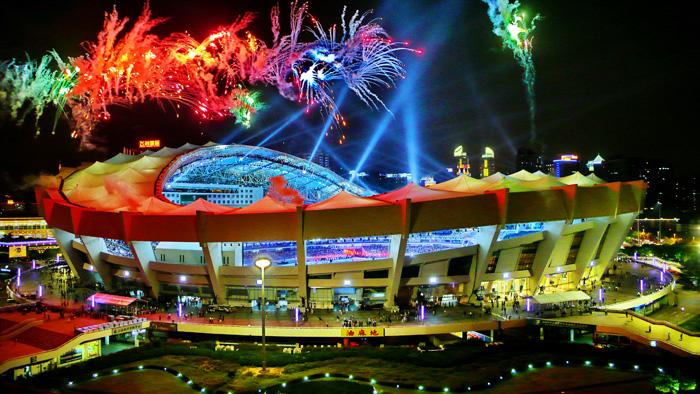The Shanghai Stadium, often referred to as the "flower of Shanghai," stands as a testament to China's prowess in sports and architectural grandeur. Situated in the heart of Shanghai, this iconic venue has hosted numerous significant events, from international sports competitions to cultural extravaganzas. Let's delve into the essence of the Shanghai Stadium and explore its significance both domestically and globally.
The Shanghai Stadium, known as "上海体育场" in Chinese, represents a blend of modern engineering marvels and traditional Chinese aesthetics. Its construction commenced in 1997 and concluded in 1999, just in time to serve as a venue for the 8th National Games of China. Designed by a consortium of architects led by Shanghai Modern Architectural Design Group, the stadium boasts a seating capacity of over 56,000, making it one of the largest stadiums in Asia.
One of the most distinctive features of the Shanghai Stadium is its innovative roof structure, resembling a giant magnolia flower. This design pays homage to Shanghai's nickname, "City of Magnolia," and adds a touch of elegance to the city's skyline. The stadium's elliptical shape further enhances its visual appeal, symbolizing unity and harmony.
Since its inauguration, the Shanghai Stadium has been a focal point for sporting events at both national and international levels. It has hosted a myriad of competitions spanning various disciplines, including football, athletics, rugby, and more. Notably, the stadium served as a venue for the 2007 Special Olympics World Summer Games, underscoring China's commitment to inclusivity and accessibility in sports.
Moreover, the Shanghai Stadium has been a nurturing ground for aspiring athletes, providing stateoftheart facilities and a platform for talent development. Its strategic location in Shanghai, a global metropolis with a rich sporting culture, further catalyzes the growth of sports in China.
Beyond its domestic significance, the Shanghai Stadium has garnered international acclaim for its architectural brilliance and hosting capabilities. Its iconic status has attracted tourists and sports enthusiasts from around the world, contributing to Shanghai's reputation as a global sports hub.
Furthermore, the stadium has played a pivotal role in fostering cultural exchange and diplomatic relations through sports diplomacy. It has welcomed athletes and spectators from diverse backgrounds, fostering mutual understanding and cooperation on a global scale.
As China continues its journey towards sporting excellence, the Shanghai Stadium serves as a guiding beacon for future development endeavors. Here are some key principles to uphold:

The Shanghai Stadium stands as more than just a venue for sports; it embodies China's quest for excellence, innovation, and unity. From its aweinspiring architecture to its profound impact on the global sporting landscape, the stadium continues to inspire and captivate audiences worldwide. As China embraces the future with unwavering determination, the Shanghai Stadium remains a shining symbol of its sporting aspirations and achievements.